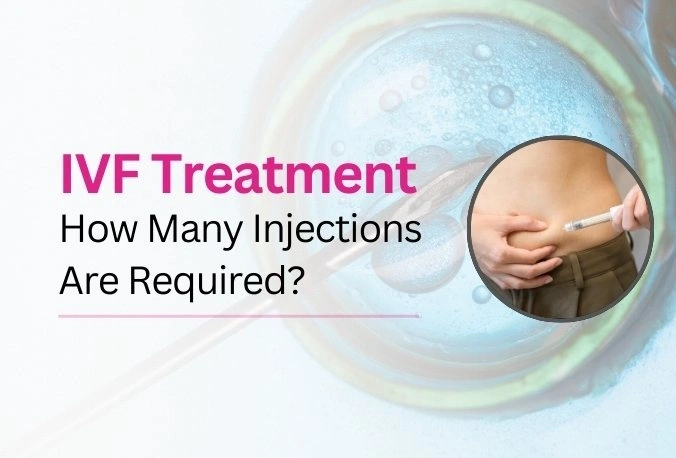How many injections for IVF treatment?
– Published on 26 Feb 2024

Welcome IVF patients, to a comprehensive guide on one of the most pressing questions you may have during your fertility treatment: How many injections will I need for my IVF treatment? As you embark on this journey towards parenthood, it is understandable that the thought of injecting yourself with medications can be daunting.
However, knowing exactly what to expect can alleviate some of the anxiety and uncertainty often associated with this process. In this blog post, we will dive deep into the science behind IVF injections and provide insights from experienced physicians to empower and educate you throughout your fertility treatment.
So let’s get started by exploring how many injections are typically required for an IVF cycle and why they are an essential part of the process.
The different stages of IVF treatment
The IVF treatment cycle typically consists of three main stages: the ovulation induction stage, the egg retrieval and fertilization stage, and the embryo transfer and implantation stage.
In the ovulation induction stage, you would be required to take hormone injections daily for approximately 8 to 14 days. The purpose of these injections is to stimulate your ovaries to produce multiple eggs, rather than the single egg that naturally develops each month.
Following this, the egg retrieval and fertilization stage takes place, which does not require injections. However, it does involve a minor surgical procedure to collect the eggs, which are then fertilized in a lab to create embryos.
Finally, in the embryo transfer and implantation stage, a selected healthy embryo is transferred into your uterus. For this stage, you might need to take progesterone injections to prepare the lining of your uterus for implantation, though these are often replaced by vaginal suppositories or oral medications these days.
In short, the number of injections you will need for IVF treatment typically revolves around the first and last stage. Understanding the purpose behind these injections can help demystify the process and help you feel more comfortable throughout your IVF journey.
Why injections are necessary for IVF treatment?
Injections are a crucial component of IVF primarily because they regulate the production and maturation of eggs, increasing the chances of successful fertilization.
Hormone injections administered during the ovulation induction stage are designed to stimulate the ovaries into producing multiple eggs, maximizing the number of potential embryos that can be created.
The progesterone injections (or equivalent oral medications or vaginal suppositories) used during the embryo transfer and implantation stage ensure that the lining of the uterus is adequately prepared for the embryo to implant.
Without these injections, the body might not produce sufficient eggs or be adequately prepared for embryo implantation, both of which could significantly reduce the likelihood of a successful IVF cycle.
Different Types of Injections Used in IVF Treatment
Intricately linked to the success of IVF treatment are varying types of hormone injections, each serving distinct roles in the process.
Follicle-Stimulating Hormone (FSH):
Primarily used in the ovulation induction stage, FSH is a synthetic hormone that stimulates the ovaries to produce multiple follicles. Each follicle contains an egg, and the goal of FSH injections is to encourage the growth of multiple eggs to increase the chances of successful fertilisation.
Human Menopausal Gonadotropin (hMG):
Another type of injection used in the ovulation induction stage is hMG. Unlike FSH, hMG contains a combination of two hormones – luteinising hormone and follicle-stimulating hormone. This dual-action hormone stimulates the ovaries directly, instigating them to produce multiple eggs.
Progesterone:
Administered in the final stage of IVF, progesterone injections, oral medication or vaginal suppositories help prepare the lining of the uterus for implantation. They assist in making the endometrium receptive to the embryo, increasing the chance of a successful implantation.
These injections play a significant role in maximising the effectiveness of IVF. Understanding their specific functions can provide a clearer picture of the IVF process and help individuals undergoing treatment to feel more prepared for what lies ahead.
How many injections a patient can expect during each stage of IVF treatment?
The number of injections a patient may expect during each stage of IVF treatment can vary significantly and is typically individualised based on the patient’s specific needs and response to treatment.
During the ovulation induction stage, injections of Follicle-Stimulating Hormone (FSH) or Human Menopausal Gonadotropin (hMG) are usually administered daily over a period of 8-14 days. This could mean up to 14 injections, although in some cases, the number may be less.
For the final stage of IVF, progesterone is typically administered daily, beginning from the day of egg retrieval and continuing until the placenta is making enough progesterone on its own, which is usually around the tenth week of pregnancy.
In total, an IVF patient can expect a significant number of injections throughout the course of the treatment. However, the exact number will depend on the individual’s specific treatment plan and how their body responds to the hormones.
Tips for managing injection schedules & techniques for self-administration
Managing injection schedules for IVF treatment can indeed be a daunting task, but with the following tips, it can be made more manageable:
- Create a schedule: Maintaining a clear and organised schedule can prove to be extremely beneficial. Noting down the dates and times for each injection can help in avoiding any missed doses.
- Set reminders: Using alarms or phone reminders can help ensure you administer your injections on time.
- Use a designated area: Having a specific, clean area where you administer your injections can help keep everything organised and reduce the risk of infection.
- Stay consistent: Consistency in the time and method of injection can help your body adapt to the medication more effectively.
When it comes to self-administration of injections, here are some techniques to consider:
- Relax: Ensure that your muscles are relaxed before injection as this can help reduce discomfort.
- Rotate injection sites: To prevent your skin from getting too sore, rotate your injection sites regularly.
- Use the correct angle: Typically, a 90-degree angle is recommended for intramuscular injections such as progesterone in oil, while a 45-degree angle is suggested for subcutaneous injections.
- Follow the instructions: Always follow the specific instructions given by your fertility specialist.
Reach out to your doctor if you’re unsure about any part of the process or if you experience any unusual reactions after an injection.
In conclusion, undertaking an IVF treatment journey is a significant commitment that requires diligence, organisation, and close adherence to medical guidance. Your IVF specialist is your trusted ally in this journey, possessing the expert knowledge to guide you through the process.
As with any medical treatment, it’s of utmost importance to follow the advice of your doctor diligently and share any concerns or issues you may be experiencing. This collaborative approach with your fertility clinic can significantly enhance your chances of a successful IVF treatment experience, leading you one step closer to your dream of expanding your family.

By Dr Samidha Dalvi-Amale
IVF and Fertility specialist Medical Director- Pune IVF
